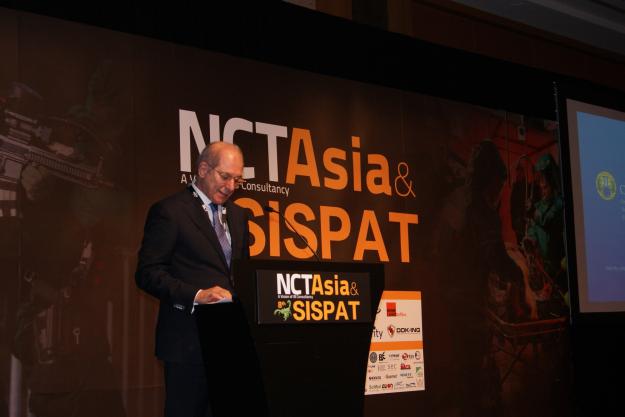
The Director-General of the Organisation for the Prohibition of Chemical Weapons, Ambassador Ahmet Üzümcü, gives a key note address at the 8th Singapore International Symposium on Protection against Toxic Substances (SISPAT).
THE HAGUE, Netherlands — 23 March 2017 — The Director-General of the Organisation for the Prohibition of Chemical Weapons (OPCW), Ambassador Ahmet Üzümcü, paid an official visit to Singapore from 21 – 22 March.
In his keynote address at the 8th Singapore International Symposium on Protection against Toxic Substances (SISPAT), Ambassador Üzümcü recounted the achievements in disarmament, verification, international cooperation, assistance and protection as the Chemical Weapons Convention (CWC) and the OPCW approach the twentieth year of their existence.
The Director-General stressed that the real threat of chemical terrorism and continuing use of chemical weapons highlighted the “urgency of the work left to be done”, and called for a “holistic approach” to addressing those challenges. In this context, he recalled the reported recent use of a chemical weapon VX in Malaysia, as well as reports on the allegations use of chemical weapons in Syria and Iraq, which are “a stark reminder of the sinister threat of chemical weapons”.
Following the Symposium, students at the S. Rajaratnam School of International Studies of the International Centre for Political Violence and Terrorism Research (ICPVTR) had the opportunity to meet with the Director-General at a lecture titled: Addressing global challenges through multilateralism – the example of the Chemical Weapons Convention.
The Director-General also visited the Protective, Analytical and Assessment Facility, Singapore’s most advanced centre for the detection of chemical, biological, radiological, nuclear and explosive materials passing through the nation’s ports.
In meetings with Singapore and other officials, the OPCW Director-General commended Singapore for its commitment to the objectives of the CWC and explored ways to further strengthen cooperation between Singapore and the OPCW. The interlocutors included: Permanent Secretary for Foreign Affairs, Mr Albert Chua; Director-General of the Singapore Customs and Head of the National Authority, Mr Ho Chee Pong; Chief Defence Scientist of the Singapore Ministry of Defence, H.E. Mr Quek Gim Pew; Deputy Commander of Chemical School, Japan Self-Defence Forces, Col. Shinji Iwakuma; Joint Programme Executive Officer for Chemical and Biological Defense, Joint Program Executive Office for Chemical and Biological Defense, USA, Mr Doug Bryce; Director of Chemical/Biological Technologies Department, Defense Threat Reduction Agency, USA, Dr Ronald Hann; Director General of Vietnam Agency for Radiation and Nuclear Safety, Prof. Dr Tuan Khai Nguyen; and representatives of the CBRN industry.
Background
Singapore joined the Chemical Weapons Convention (CWC) in 1997. Singapore actively partakes in OPCW-related activities, and has been a generous host to a number of international cooperation and assistance events. Singapore remains a key regional partner as a Member State with advanced and expanding chemical industry.
As the implementing body for the Chemical Weapons Convention, the OPCW oversees the global endeavour to permanently and verifiably eliminate chemical weapons. Since the Convention’s entry into force in 1997 – and with its 192 States Parties – it is the most successful disarmament treaty eliminating an entire class of weapons of mass destruction.
To date, nearly 95 per cent of all chemical weapon stockpiles declared by possessor States have been destroyed under OPCW verification. For its extensive efforts in eliminating chemical weapons, the OPCW received the 2013 Nobel Prize for Peace.
